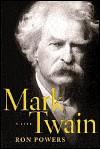 Ron Powers, Mark Twain : A Life
Ron Powers, Mark Twain : A LifeFrom Publisher's Weekly:
Starred Review. After dozens of biographies of Twain (1835–1910), one can fairly ask, "Why another?" But Powers, who wrote about Twain's Missouri childhood in Dangerous Water: A Biography of the Boy Who Became Mark Twain, early on promises "interpretive portraiture," which entails doing something that has never quite been accomplished before: presenting the totality of the man in his many moods and phases of life, including acerbic son and brother, prank-prone youth, competitive writer, demanding friend, loving husband and, eventually, globe-trotting celebrity. In doing so, Powers succeeds in validating his own assertion that Twain became "the representative figure of his times." Powers demonstrates that Twain embodied America during the tumultuous latter half of the 19th and early 20th centuries, from the divided self of the Civil War, through the unstable prosperity of the Gilded Age, to the verge of WWI. All the while, Twain asserted in both literature and life his confidence in New World progress over Old World conservatism. Unlike Twain, whose prose Powers characterizes as "wild and woolly," the biographer is lucid and direct while maintaining a steady hand on the tiller of Twain's life as it courses a twisty path as wide and treacherous as the Mississippi itself. Powers, a wise, if loquacious captain, takes us on a wonderful journey from beginning to end.




No comments:
Post a Comment